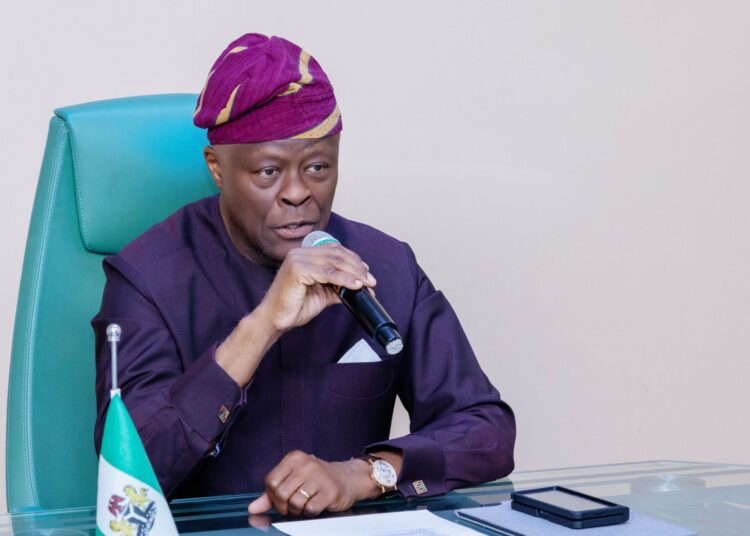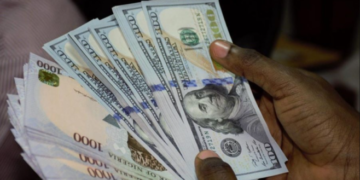Minister of Finance and Coordinating Minister of the Economy, Wale Edun, has clarified that the controversial five per cent fuel surcharge, often described as a fuel tax, will not be implemented immediately and is not a new levy as widely speculated.
Speaking at a press conference in Abuja on Tuesday, Edun said the provision was only restated in the Nigerian Tax Administration Act 2025, signed into law earlier this year, and will not take effect automatically in January 2026 when the Act becomes operational.
“As of today, no order has been issued, none is being prepared, and there is no plan—no immediate plan—to implement any surcharge,” Edun stated. He also failed to state when the fuel tax would take effect.
His remarks followed weeks of criticism from opposition political parties, labour unions, and public commentators who argued that the law would further burden Nigerians already struggling with economic hardship.
However, the Finance Minister explained that the surcharge had existed since 2007 under the Federal Road Maintenance Agency (FERMA) Act, where it was designed as a user charge to fund road maintenance. Under that framework, 40 per cent of the proceeds went to FERMA, while 60 per cent was shared with state-level road agencies.
“What the new Act has done is not to create a new tax, but to harmonise and consolidate existing provisions into a single transparent framework,” Edun said. “The inclusion of the surcharge in the 2025 Act does not mean an automatic introduction of new taxation.”
The Nigerian Tax Administration Act 2025 is part of four major reform bills that represent the country’s most comprehensive tax overhaul in decades. The others are the Nigerian Tax Bill, the Revenue Service Bill, and the Joint Revenue Board Bill. Together, they aim to simplify compliance, eliminate overlapping taxes, and improve coordination among federal, state, and local tax authorities.
According to Edun, the harmonisation of the surcharge is one of many measures designed to modernise Nigeria’s tax system, strengthen governance, and attract investment through greater transparency.
“This is about building an inclusive and growing economy. By consolidating taxes into one framework, businesses and individuals will find it easier to comply. It also reassures investors that Nigeria is serious about creating a fair and transparent tax environment,” he noted.
The Minister stressed that the law’s provision on fuel surcharge cannot come into effect without due process, including the issuance of a commencement order by the Finance Minister and publication in the official gazette.
Edun said the government would have to engage and consult with stakeholders, create awareness on the modernised system and when it will be implemented.
“It is not automatic that we wake up on January 1 and there’s a new tax being levied,” Edun explained. “A whole formal process is involved, including broad consultation, technical preparation, and public sensitisation.”
He added that the government recognises the economic pressures faced by Nigerian households and businesses and would not introduce measures that worsen the current hardship. Instead, he said, the administration focuses on blocking revenue leakages, improving efficiency, and ensuring macroeconomic stability.
Beyond road funding, the surcharge has also been justified on environmental grounds to gradually discourage excessive dependence on fossil fuels while incentivising cleaner energy alternatives. The levy does not apply to renewable energy products, household kerosene, cooking, or compressed natural gas.
“The policy objective aligns with global trends. It is about balancing development needs with sustainability, while ensuring Nigerians have access to safe, affordable alternatives,” the Minister said.
Edun underscored the administration’s broader economic vision of creating jobs, fostering private sector-led growth, and building inclusive prosperity. He described the tax reforms as “deliberate, evidence-driven, and phased,” insisting they were designed to protect citizens from excessive burdens.
“Our priorities are to strengthen tax governance and improve revenue utilisation rather than just levy new charges,” he said. “Government is fully aware of the pressures of the time and will not take decisions that make things more burdensome for Nigerians.”
The Finance Minister highlighted the progress already made in stabilising the economy, pointing to renewed investor confidence and positive signals from international development partners and rating agencies.
“It is our collective responsibility to translate these reforms into better jobs, higher incomes, and improved public services,” Edun said. “The Nigerian economy is on a path of structural transformation, and the tax reforms are a central pillar of that journey.”
Edun’s clarification suggests that Nigerians will not face an immediate increase in fuel costs come January 2026. Instead, the government appears set on a cautious, phased approach—balancing the need for more revenue and cleaner energy with the imperative of protecting citizens from further hardship.





